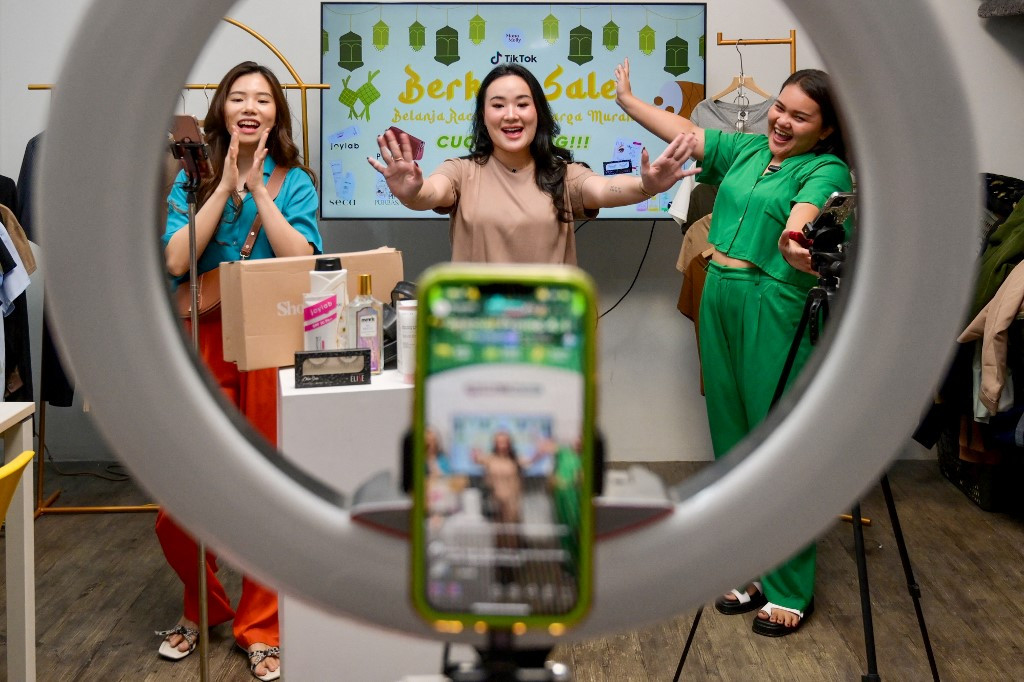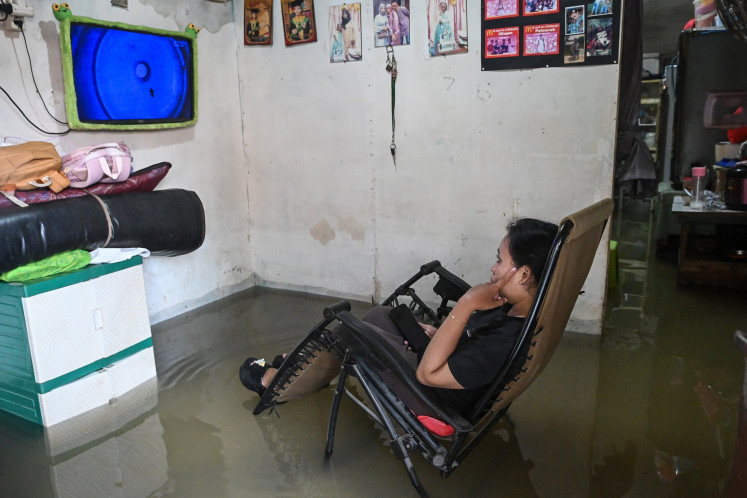Popular Reads
Top Results
Can't find what you're looking for?
View all search resultsPopular Reads
Top Results
Can't find what you're looking for?
View all search resultsPicking on TikTok?
TikTok seems to present an easy target for many countries, but seeing how the line between communication and trade is blurring today, especially in the retail sector, the government would do well to take a look at the broader implications of banning social commerce, lest it clamp down on homegrown start-ups that are supporting Indonesia's economic backbone: MSMEs.
Change text size
Gift Premium Articles
to Anyone
TikTok has come under the spotlight yet again.
Top government officials have accused the video hosting platform of predatory pricing and monopolistic practices that have inflicted losses to many brick-and-mortar shops in Jakarta’s major textile hub Tanah Abang, as well as to micro, small and medium enterprises across the country.
As a result, the government is thinking about revising the trade laws to ban social commerce, or selling and buying goods via social media platforms.
As all institutions and individuals stand equal before the law and must therefore abide by it, TikTok and other technology companies are subject to regulations. Fair regulations ensure sustainable business practices as well as stimulate economic growth and welfare distribution in the country.
Governments across the world are demanding transparency and accountability of tech companies amid their growing influence in society, even politics.
The United States and China have grilled Big Tech operations on their own and each other’s turf, including those of Google and Alibaba, over concerns that practices are becoming increasingly predatory in terms of both business competition and personal data privacy.
Indonesia has at least two major regulations applicable to tech companies. One mandates the registration of tech companies, both local and foreign, with the Communications and Information Ministry. This includes general disclosure of their systems and the types of user data they gather and process.
The other mandates the registration of e-commerce companies and all businesses that use their services with the Finance Ministry’s Taxation Directorate General toward compliance with the digital tax rules.
The latest idea to regulate social commerce looks a bit hasty, however, as it could potentially discourage growth in Indonesia’s e-commerce sector.
If the government bans selling and buying goods on social media, this will not only affect TikTok but also other social media platforms like Facebook, Instagram and WhatsApp, as well as all businesses that use their services. It may also affect established, homegrown e-commerce companies like Tokopedia, Lazada and BliBli.
When accusing TikTok of predatory pricing, government officials should also look at resolving the root cause. Predatory pricing typically stems from businesses or individuals offering goods at prices far lower than their competitors, sparking allegations of scamming. If this is proven, TikTok should bear responsibility.
In fact, TikTok has a serious problem with content moderation and is recognized for its ineptitude in supervising content from its rapidly growing number of global users. Many countries are currently trying to contain the platform’s negative societal impacts.
The European Union has slapped a fine of around US$370 million on the company for its weak protection of children’s personal information, in direct violation of the bloc’s data protection laws.
In the US, TikTok and its Beijing-based parent company ByteDance are seen as a threat to national security over fears of sharing sensitive user information, including geographical location, to the Chinese government. Some US states and cities have banned installing the app on corporate devices, or have banned the app’s use altogether.
African countries, including Kenya and Somalia, have either banned or are considering banning TikTok for its lax content control, which has allowed the spread of sexually explicit content.
In Asia, India banned TikTok following its 2020 border skirmish with Chinese troops in the Himalayas, accusing the platform of transmitting data to China.
In Indonesia, TikTok has empowered entrepreneurs, especially small-scale entrepreneurs in remote regions, to market and sell their products directly to customers without compromising their margins for distributor and reseller costs.
What happened to Tanah Abang Market is a classic case of how online shopping replaces physical stores (remember Amazon in the 1990s?) and cannot be blamed on TikTok alone. This could easily have happened when Tokopedia and other e-commerce platforms started disrupting the conventional business model, especially when consumers shifted en masse to online shopping during the pandemic.
Still, TikTok’s model of blending e-commerce and entertainment, with its primary video feature enabling individual sellers and manufacturers to interact directly with customers via TikTok LIVE, could amplify the platform’s overall impact on the digital retail ecosystem.
But if it bans TikTok from engaging in social commerce, the government risks banning that entire subsector of e-commerce.
So before it ends up setting off that regulatory domino effect, the government might want to check the company’s operational basis, because this just might not be another isolated TikTok problem.











